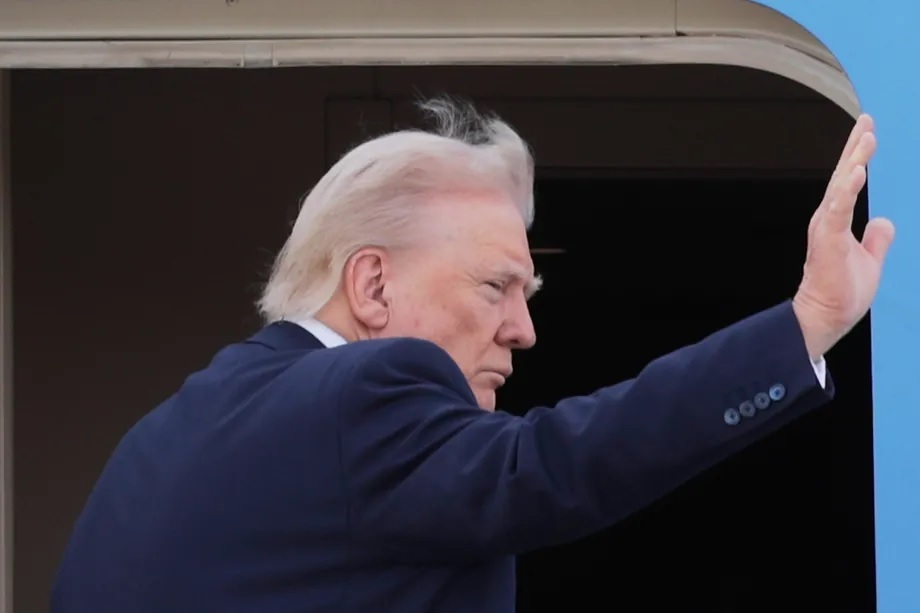Donald Trump likes to boast and exaggerate. Every day he claims to have broken all kinds of historical records, surpassed unprecedented marks, achieved feats more than successes. This not only involves inflating macroeconomic figures or saying things that are obviously false, such as having already reached 200 trade agreements in recent days, but also putting leaders of other countries in a more than uncomfortable position, torn between correcting inaccuracies or blatant lies, unleashing the wrath of the White House, or avoiding problems by ignoring or dodging questions. The vast majority choose the second path; a few opt for something hybrid, as did Emmanuel Macron and Keir Starmer in the Oval Office, specifying some fact or data, but always smiling and praising Trump's ego. And others, like Volodimir Zelenski, and now China from a distance, do not avoid the clash.
Trump has declared a total and unilateral trade war on the entire world, but especially on China. He has imposed 10% tariffs on all its partners, with the threat of figures up to ten times higher shortly, after a temporary backtracking. But he has raised those on the Asian giant to 145%, more or less. Because for every announcement, warning, threat, and consummation, there is always a qualification, such as the exemption for technological products, phones, and computers, the bulk of which come from China, something that was known through a customs order and an official statement.
But while delivering a blow, he is desperately trying to steer the situation. Trump accuses Beijing of manipulating its currency (completely true), flooding markets with cheap products (also true), and subsidizing its companies while hindering foreign ones (again, correct). But at the same time, he says he has a great relationship with President Xi Jinping, which is a hyperbole at best. He claims there will soon be an agreement, which for now is more of an aspiration or a wish than something evident. And above all, he maintains that tariff negotiations are underway and that Beijing has knocked on his door to resolve the dispute. And here is where the biggest problem arises because the Chinese government says that both things are lies and demands that Washington stop "spreading confusion" with things that are not true.
This Friday, the magazine Time published an interview with Trump in which the president maintains that he would consider it a "total victory" if the United States maintains tariffs of up to 50% on foreign imports within a year and ensures that Chinese President Xi Jinping has called him and that his administration is actively engaged in discussions with China to reach an agreement. Commerce Secretary Howard Lutnick and another senior official in the administration confirmed the talks to the magazine, something that Beijing denies. "I don't think it's a sign of weakness on his part," Trump said about Xi, adding that he expects to have a complete list of agreements announced in the next three or four weeks.
The White House has been twisting the narrative for two weeks to suggest that China is about to call seeking an agreement, something that has become the administration's flagship. After the chaos in the markets and the rise in the US bond risk premium, Trump had to partially backtrack, but they cling to the idea that everyone is calling desperately for an agreement. "They call to kiss my ass," Trump even said in a chat a few days ago, insulting and trying to humiliate his partners or neighbors. But China says it neither calls nor has had "consultations or negotiations," urging Washington to "not mislead public opinion," in the words of Foreign Ministry spokesperson Guo Jiakun.
When asked by the press this Friday, before departing for Rome for the Pope's funeral, if it was true that he had spoken with President Xi, Trump replied that he had spoken with him "on numerous occasions" and that he would meet with foreign leaders during his stay in Europe, but he did not clarify whether he had actually spoken with Xi since the imposition of tariffs, something that does not seem to have occurred at any point.
Spokesperson Guo emphasized that "there have been no economic or trade negotiations between China and the United States on the tariff issue," and stressed that this position was clarified this week by both him and Commerce Ministry spokespeople. Asked about reports of possible data collection by Chinese authorities to evaluate specific exemptions from the 125% tariffs imposed on certain US products, as reported by some American media, who see it as their silent response to Trump's backtracking, Guo indicated that he does not have details on the matter.
On Thursday, He Yadong, spokesperson for the Ministry of Commerce, stated that "there are no economic or trade negotiations between China and the United States" and that "any claims of progress are baseless rumors without objective evidence." Beijing does not play along, nor does it intend to step into the lion's den with a visit to the White House or public negotiations.
